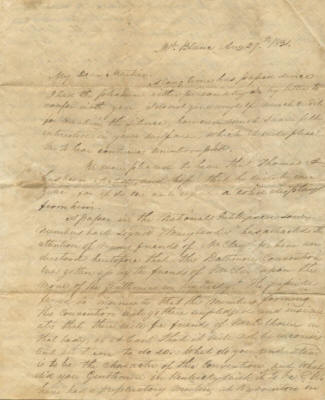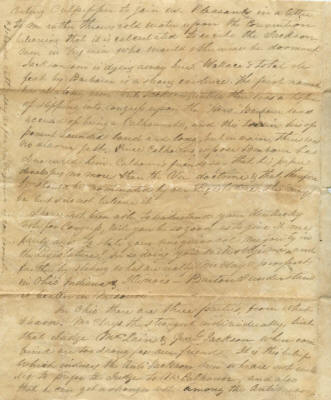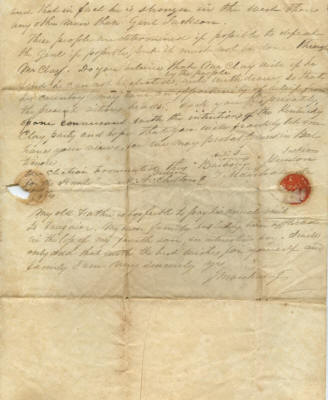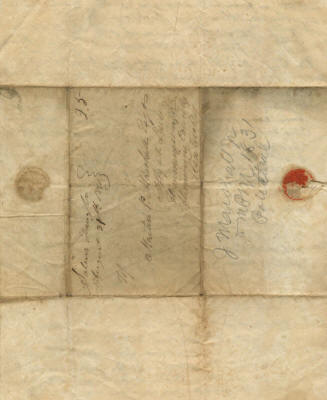902602
John Marshall, Jr.
Click on image for larger size
John Marshall, Jr., 1798-1833. Son of Chief Justice John Marshall. Outstanding content Autograph Letter Signed, J Marshall Jr, three pages, with integral leaf, 7¾" x 9¾", “Mt. Blanc,” [Fauqier County, Virginia], August 27, 1831.
Marshall, the fourth son and namesake of the most influential Chief Justice in American history, seeks information from his cousin, Martin P. Marshall, who practiced law in Kentucky. In this letter, full of excellent political content, he writes of Andrew Jackson, John C. Calhoun, and Martin P. Marshall's close friend, Kentucky Senator Henry Clay, whom John Marshall, Jr., apparently also supported. In full:
My dear Martin
A long time has passed since I had the pleasure either personally or by letter to confer with you. I do not give myself much credit for breaking the silence, however much I have felt interested in your welfare, which it will please me to hear continues uninterrupted.
We were pleased to hear that Thomas A. has been elected, and hope that he will be energetic, for if so we anticipate a solid display from him.
A paper in the National Intelligencer some numbers back signed “Marylander" has attracted the attention of many friends of Mr. Clay. We have understood heretofore that the Baltimore Convention was gotten up by the friends of Mr. Clay upon the move of the Gentlemen in Kentucky. The paper referred to insinuates that the members forming this convention will go there unpledged and insinuates that there will be friends of Mr. Calhoun in that body, or at least that it will not be inconsistent in them to do so. What do you understand is to be the character of this Convention, and what did you Gentlemen in Kentucky wish it to be? We have had a preparatory meeting at Warrenton inviting Culpepper to join us. Pleasants in a letter to me rather throws cold water upon the *Convention believing that it is calculated to excite the Jackson men in Virginia who would otherwise be dormant. Jacksonian is dying away here. Wallace's total defeat by Barbour is a strong evidence. The first named has all along been anti Jacksonian, untile [sic] there was a hope of slipping into Congress upon the “Hero." Barbour was accused of being a Calhounide, and this tresin [sic] his opponent sounded loud and long, but in vain, thus was no alarm felt. Since Calhouns escpose [sic] Barbour has denounced him. Calhoun's friends say that his paper developes [sic] no more than the Va doctine & that therefore he should be nominated by our Legislature. This may be but I do not believe it.
*I should rather say as far as Virginia is concerned.
I have not been able to understand your Kentucky vote for Congress, will you be so good as to give it me fairly and to state your unequivocal majority in the Legislature? In so doing you will oblige me, and farther by stating what are really Mr. Clay's prospects in Ohio Indiana & Illinois—Barton I understand is beaten in Missouri.
In Ohio there are three parties, from what I learn. Mr Clays [sic] the strongest individually, but that Judge McLain & Genl Jackson when combined are too strong for our friend. It is this belief which induces the Anti Jacksonian men who are not with us to prefer the Judge to Mr. Calhoun, and also that he can get a stronger vote among the Anti Masons and that in fact he is stronger in the west than any other man than Genl Jackson.
These people are determined if possible to defeat the Genl if possible [sic], but it must not be done through Mr. Clay. Do you believe that Mr. Clay will if he finds he cannot be elected, by the people will withdraw, so that his country may have an opportunity of relief from the present vitious [sic] heads? I ask you this privately, as one conversant with the intentions of the Kentucky Clay party and hope that you will frankly let me have your views, for we may probably meet in Baltimore.
Our election terminated this ”Barbour /Anti J– Congress/ for the Senate” Hunton /Jackson/ M. A. Chilton /Jackson/ & T Marshall /Clay/ Delegates.
My old Father is too feeble to pay his annual visit to Fauquier. My own family has lately been afflicted in the loss of my fourth son, an interesting boy. I will only add that with the best wishes for yourself and family I am very sincerely yrs
J Marshall Jr
Martin Pickett Marshall (1798-1883), to whom this letter was written, was the son of Chief Justice Marshall's younger brother, Charles, and thus was a cousin of John Marshall, Jr. The two were born the same year. When Charles died in 1805, the Chief Justice took the 7-year-old Martin to live with him and his family in Richmond, Virginia. Martin remained there several years, reading history and philosophy, and thus was as much a son to John Marshall as he was a nephew.
Martin moved to Kentucky in 1816, where other Marshall family members lived. He studied law under another of Chief Justice Marshall's brothers, Alexander K. Marshall, and was licensed to practice law in 1818. Interestingly, he then married his cousin, Eliza Colston Marshall, the daughter of yet another of Chief Justice Marshall's brothers, Thomas, and his second wife. Thomas lived in Kentucky as well.
Martin moved to Cincinnati after his marriage and practiced law there 11 months before returning to Kentucky for health reasons. He was known as a great student, with a “well selected" library, and a natural orator. He ultimately became prosecuting attorney, state representative, state senator, and a four-time presidential elector, twice for Clay. Although Martin was a slave owner—one contemporary writer noted that he lived in "very fine" style and that "every one of his children is waited on at breakfast, dinner &c. by a little slave"—he opposed secession and was a strong supporter of the Union during the Civil War.
The letter has normal mailing folds; some creases and toning, as the scans show, that are not uncommon for a piece this old; paper loss where the wax seal was located, affecting one word; and a few tiny fold splits, slightly affecting a couple of words. A pencil note in another hand beneath the address panel notes “J Marshall Jr / to MPM 1831 / Political." Overall the letter is in very good condition.
Unframed.
_____________
This item has been sold, but
click here to see other
American History items
that we are offering.
|
|
|







